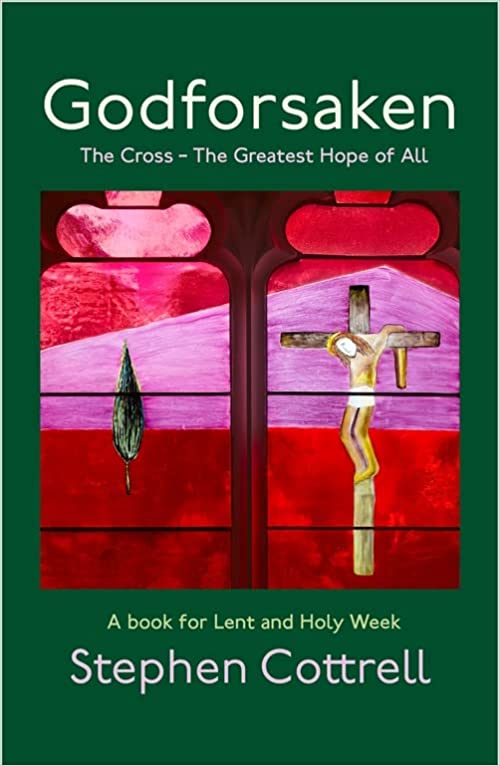Godforsaken: The cross – the greatest hope of all by Stephen Cottrell
'A good book for Lent; if you are facing death or the death of a loved one; or if you just want to figure out what it is you really believe these days as a Christian'
 Godforsaken: The cross – the greatest hope of all
Godforsaken: The cross – the greatest hope of all
By Stephen Cottrell
Hodder & Stoughton
ISBN: 978-1399805254
Reviewed by Terry Young
I’ve had the Archbishop of York’s Lenten reflections on my laptop for a while, knowing that Lent is getting closer and I’ll need to get a review out if it is to help anyone. I guess I shrink from Lent, not because I’m not deeply into the Church calendar – although it’s not a great focus of my year – but because the studies always seem to be so sad. Had I come across something like this a few decades ago, it might have changed my view of the genre, perhaps of the entire season.
Having finally read it, I feel like Sam’s friend in Dr Seuss’s story who discovers a liking for, ‘Green Eggs and Ham’: I like this set of meditations with questions and the content they cover. I wasn’t sure how creative or inspiring a book could be if the chapters were labelled logically but without further insight from One to Seven, but I pressed on.
I like its brevity, which is always a great commendation (a 648-page tome arrived today for review). I like the stories – often personal, usually well-observed and occasionally recounting Stephen’s own failure to grasp the obvious – and their relevance to his theme.
I can’t find any attribution to the poems on page ix or on what would be page 117, if it had a number, so I assume them to be Stephen’s work, and I like them, too. I like the love of language soaked into the text in lucid English for a modern audience, and especially in noting that the central cry upon which each chapter is founded, started life in a Hebrew Psalm, was screamed by Jesus in Aramaic from the cross and made no sense to anyone listening, except for a (Latin-speaking?) foreigner who sensed a meaning beyond interpretation. What we have was written down in Greek and translated many times into English until we have the choice of variants before us today.
What I most like, is that having chosen part of a single verse (Mark 15:34, ‘Eloi, Eloi, lema sabachthani?’), he turns in each meditation to share something about Jesus. Usually, I dislike this way of preaching, but it works here.
There’s good theology in there – on the Trinity, for instance – and well-presented Christian teaching about why we need to be rescued (or healed or saved – pp 15-16) and the price of doing so. Sometimes, I find books such as this launch into the author’s pet theme or to go all abstract and when you try to sum it up, there isn’t much to say. But it is not like that here – it’s very concrete: It’s about Jesus; what happened that dark afternoon; what led up to it (starting hundreds of years before); and what came next. I really like that.
I found the real-life episodes around dying helpful, too, especially Chris’ story (pp 59-62). As a team vicar, Chris was dying in his late fifties and is entertaining in evading the best intentions of his High Church and Low Church friends. His experiences in prayer and learning about prayer in a new way, essentially from scratch, are both moving and, I hope, some of what you will hold onto and take from this book.
As Stephen points out, the last words of Jesus that Mark records are also the first line of Psalm 22. In fact, Amazon’s description of this book in its link is: UNTITLED-PSALM-22-LENT-BOOK. Stephen encourages us to learn some psalms to inform our praying and also, so that when all else fails and we are falling apart, we can fall back on another’s words. However, he goes much further and teaches us how to use psalms practically. Again, I really like this. So many Christian writers feel it is their job to scoop the message from a passage and plonk it down on your plate. Job done!
Stephen sees himself more as a TV cook, showing you how to prepare the meal for yourself. Yes, he shows what it means; yes he explores how the early church understood and used the psalms; but he really wants you to be able to use psalms in all their heights and depths of human experience in your worship and everyday living.
It’s a good book for Lent. It’s a good book if you are facing death or the death of a loved one. It is a good book if you just want to figure out what it is you really believe these days as a Christian.
As I say, I like it!
Terry Young is a missionary kid who read science and engineering. After a PhD in lasers, he worked in R&D before becoming a professor, when he taught project management, information systems and e-business, while leading research in healthcare.
He set up Datchet Consulting to have fun with both faith and work and worshipped at Baptist churches in Slough for 19 years before moving to the New Forest
Baptist Times, 03/02/2023